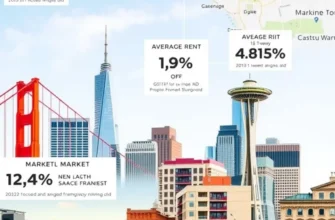Relocating to a new city can be thrilling, but it often comes with its share of challenges, especially when it comes to finding the right accommodation. Whether you’re a young professional seeking career opportunities, a student eager for campus life, or a family embarking on a fresh start, short-term rentals offer flexible living solutions tailored to your needs. Major U.S. cities are bustling with rental options that cater to a diverse range of lifestyles and budgets. Navigating these markets requires insight into local neighborhoods, rental typologies, and budgeting strategies. This guide aims to empower you with practical knowledge and tips for exploring rental markets in urban environments such as New York, Los Angeles, and Chicago, ensuring that you find a short-term rental that suits your unique requirements. From cozy studios to family-sized apartments, your ideal temporary home awaits. Let’s explore the vibrant landscapes where modern city living meets the comfort of home.
Understanding the Rental Landscape

Navigating the rental market in major U.S. cities requires an understanding of several key dynamics. Each city has its unique real estate trends, neighborhood features, and pricing variables that can significantly impact your search for the perfect short-term rental.
Real estate trends vary widely between cities. For instance, in booming tech hubs like San Francisco and Seattle, demand outpaces supply, leading to higher rental prices. Meanwhile, cities such as Austin and Denver have seen increased development, offering more opportunities for renters in newly constructed buildings. Seasonality also plays a role; summer is a peak moving season in many cities, leading to steeper rents and more competition.
Neighborhood features can enhance or detract from your living experience. Proximity to public transportation, local eateries, parks, and cultural institutions should be top considerations. In places like New York City, blocks can feel like entirely different worlds, so understanding the unique vibe and amenities of each neighborhood is crucial. Websites dedicated to local guides, such as best areas to rent in Reno, NV, can offer valuable insights into the best areas to target or avoid.
Rental prices can vary not only from city to city but also from neighborhood to neighborhood. In Los Angeles, for example, areas like Santa Monica and Beverly Hills command a premium, whereas neighborhoods farther from the city center might offer more budget-friendly options. Renters should have a clear picture of their budget and be prepared to compromise on certain amenities to remain within their financial limits.
When evaluating potential rental properties, amenities can make all the difference. High-speed internet, in-unit laundry, and modern appliances are often essential for urban living. Access to fitness centers, communal workspaces, and pet-friendly policies may tip the scales when choosing between properties. Balancing these amenities against the cost is essential for ensuring you’re getting value for your money.
Effective property evaluation involves more than just a checklist of amenities. It’s important to inspect the property for maintenance issues and consider safety features like secure entry systems and proper lighting. Ensuring your new home meets your personal safety standards can save you from future hassles and expenses.
Renters must also be prepared to act quickly in fast-paced markets where desirable properties are snatched up quickly. Having all required documentation, such as proof of income and personal references, ready can provide a critical advantage.
Being aware of these dynamics provides a crucial head start in securing your ideal short-term rental. With the right knowledge and strategic approach, urban living can be both rewarding and comfortable.
Practical Tips for Securing Your Short-Term Rental

Securing a short-term rental in a bustling city can be challenging, but some strategic approaches can simplify the process. Leveraging local resources is a vital starting point. Contact local real estate agents who specialize in short-term rentals; their insights can be invaluable. Visiting neighborhood community boards can also uncover rental opportunities not listed online.
Effective online platforms are another critical avenue. Prioritize websites that focus on short-term rentals, allowing you to filter by necessary amenities and neighborhood preferences. Setting up alerts can ensure you are notified of new listings matching your criteria.
Negotiate with potential landlords to secure favorable terms. Prepare by researching comparable rental prices in the area. Present a compelling rental application by highlighting your rental history, financial stability, and willingness to provide references. These steps can facilitate better deals.
Understanding what to expect during the rental application process is key. Be ready to provide identification, financial statements, and character references. Some landlords may require a background check, so be transparent to expedite the process.
Utilizing community contacts can often reveal opportunities through word-of-mouth. Friends or acquaintances residing in your desired area may know of impending vacancies. Join local social media groups or forums where members share rental information and advice.
Understanding local regulations is indispensable to avoid legal pitfalls. Short-term rental laws vary widely by city, covering lease requirements, tenant rights, and landlord obligations. Consulting local housing authorities or online resources can keep you informed of specific regulations.
For a comprehensive approach to avoid rental issues, understanding billing procedures also plays a crucial role. Consider consulting resources like resolving rental billing errors to navigate potential financial discrepancies.
By employing local resources, utilizing online tools, and leveraging community contacts, you can enhance your chances of securing the perfect short-term rental. Understanding the nuances of negotiating and navigating rental applications will empower you to find a space that suits your lifestyle.
Final words
Finding a short-term city rental doesn’t have to be an overwhelming task. By understanding the rental landscape and employing practical strategies, you can navigate urban markets more effectively. Remember to leverage local resources, evaluate properties thoughtfully, and stay informed about the amenities that matter most to you. Your next urban adventure is just a key away, and with the right tools and knowledge, securing your new home can be an enjoyable process. Embrace the opportunities awaiting you in your new city with confidence!









